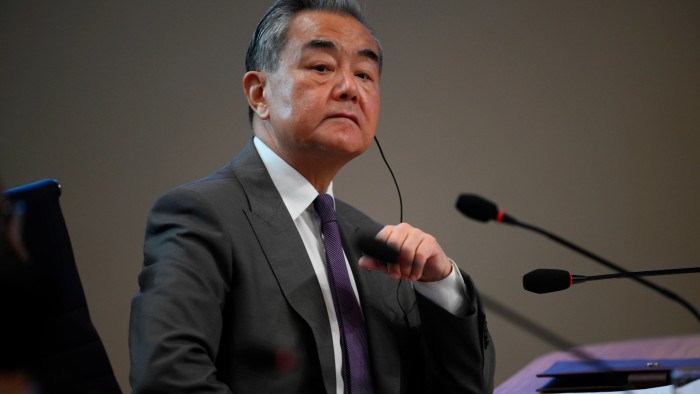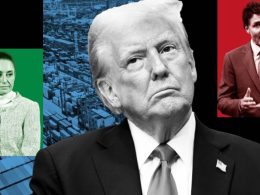Unlock the White House Watch newsletter for free
Your guide to what Trump’s second term means for Washington, business and the world
China has stepped up an international propaganda campaign against the US trade war, unleashing a series of slick videos portraying itself as standing up against American “bullying” on behalf of the rest of the world, especially the “weak” in developing countries.
Posted by the ministry of foreign affairs on social media, the videos represent a dramatic hardening of Beijing’s diplomatic stance in the trade war and are part of a charm offensive designed to portray China as championing free commerce while Washington “slaps its allies in the face”.
The propaganda videos contrast dark scenes of Wall Street chaos and angry American protesters with a bright and futuristic China, illustrated by high-tech humanoid robots and rockets shooting into space.
In images chosen to highlight China’s positive relationships with other countries, Mercedes-Benz chief executive Ola Källenius is seen speaking at a recent conference in Beijing and an African traditional tribesman is pictured apparently making a deal with a Chinese businessperson.
The latest video, titled “Never Kneel Down”, was released on Tuesday and warns countries not to make deals with the US, reflecting concerns in Beijing that US President Donald Trump is using tariffs to force other countries to join America in isolating China.
“Bowing to a bully is like drinking poison to quench a thirst,” the video said.
“China won’t back down so the voices of the weak will be heard,” it added, showing images of African children. “Bullying will be stopped . . . when the rest of the world stands together in solidarity, the US is just a small stranded boat.”
The rhetoric in the videos, which directly cites the US and even Maga, Trump’s “Make America Great Again” political movement, comes as both sides grapple with the growing fallout of what amounts to an embargo on bilateral trade, with the US and China levying tariffs of 145 per cent and 125 per cent on each other’s goods respectively.
Both have signalled they are open to talks and have granted exemptions to some essential products. But there are still no signs of serious negotiations despite claims from Trump that President Xi Jinping has called him.
Xi toured Vietnam, Malaysia and Cambodia this month to strengthen ties as part of what analysts have described as China’s trade war charm offensive that also includes Europe and Latin America.
Late on Monday, foreign minister Wang Yi told his counterparts at a meeting of the Brics group of emerging countries that appeasement would only embolden the US “bully” and urged them to fight back.
China wants “to try and shore up its support in western and non-western capitals to prevent Trump forming an anti-China trade bloc”, said Neil Thomas, a fellow at the Asia Society’s Policy Institute’s Center for China Analysis.
In the “Never Kneel Down” video, Beijing also tries to warn traditional US allies that Washington is not a reliable partner, highlighting its past treatment of Japan with the 1985 Plaza Accord that led to the appreciation of the yen and “decades of anaemic growth”.
The videos, along with increasingly forceful commentaries in state media, show China is digging in for a long stand-off with the US.
State-owned Beijing Daily on Monday published a commentary stating it was necessary to view the trade war through the lens of chairman Mao Zedong’s 1938 speeches “On Protracted War” and brace for a prolonged struggle.
“Facing the butcher’s knife, many countries previously fantasised about ‘feeding themselves to the wolves’ in exchange for a moment’s fragile safety,” the commentary says. “For China, hoping to gain a reprieve through unilateral compromise is fundamentally impossible.”
The commentary says China’s strength lies in remaining patient and resisting premature calls for compromise. Backing down or rushing to negotiate would not only weaken China’s position, but also misunderstand the long-term nature of the conflict, the unnamed author wrote.
The tougher rhetoric in the Chinese propaganda recalls the plunge in relations between the two countries during Trump’s first term, when Beijing unleashed a brash new combative approach to international relations known as “wolf warrior” diplomacy — named after a set of films in which Chinese special-operations fighters defeat western-led mercenaries.
Source link









